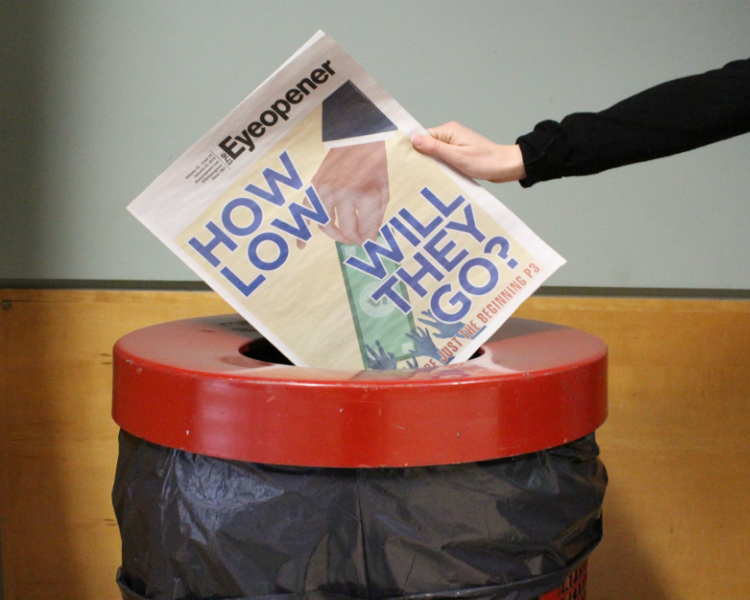In October 2018, when the University of Prince Edward Island (UPEI) released a new sexual violence policy, it ignored many of the suggestions made by students, according to an article by editor-in-chief of UPEI’s campus newspaper The Cadre, Allison O’Brien. O’Brien was the only member of the media to show up to the university’s board of governors meeting and reported on the exclusion of students’ suggestions as well as lack of transparency with the policy rollout. Other news outlets in P.EI. reported on the sexual violence policy being introduced at the university, but failed to mention all the complications involved.
“These are stories that we covered that really mattered to students and I feel like we covered them better than CBC and The Guardian,” O’Brien says. She says they received a huge positive response from the student body about the story. “And it’s not even just university students that read our stuff. We’ve got a lot of new followers this past year who have been reading our stuff and I’ve been looking at the demographic of the people who like and share our content and they’re 40 [to] 50 years old.”
Last week, the Ontario government made an announcement on post-secondary tuition declaring “institutions will be required to provide an online opt-out option for all non-essential non-tuition fees.” Services like the WalkSafe name programs and athletics are considered essential, but student unions and organizations, including campus media, are not. Many journalists and organizations expressed concern about what this means for student journalism. A statement from the Canadian University Press reads, “In other words, it will be up to the institutions to decide if the very media that covers them is essential.”
Under the new policy introduced by the Ford government, this opt-out option introduces the concept of “voluntary student unionism,” Alex Usher, an expert in student financial aid and quality of post-secondary education writes on his site, Higher Education Strategy Associates. The Alberta government has also been toying with the idea of voluntary student unionism for a few years now but Ontario is the first province in the country to instate it, according to Usher. National organizations like the Canadian Federation of Students (CFS) and Canadian Alliance of Student Associations (CASA), will also be affected as these organizations also depend on reliable funding from student fees to function. These organizations represent hundreds of thousands of students across the country. Thus, these changes won’t just affect student unions and media in Ontario, but the rest of the country as well.
Student media often encounter challenges in reporting stories. Ford’s announcement follows a lively debate about how both organizations and institutions deal with student journalists. In August last year, University of Toronto’s media relations team’s refused to speak to student journalists outside their institution. But that decision highlighted challenges student journalists face in their quest for stories and sources. In many cases, campus publications are the only media organizations reporting on institutions and/or the community in which they operate. And so, for many communities, a loss or reduction in funding for campus papers will affect more than just the student body or the institution in question—it can have an impact on how the general public in those communities are informed as well.
The Guelph Public Library, Ray’s Chinese Restaurant, and Super Coin Laundry are just a few of many places around Guelph, Ont. where you can pick up The Ontarion, University of Guelph’s student newspaper. This was especially important to the community during the municipal elections in October 2018, when the Ontarion received positive feedback for its coverage of the election. The praise came not only from the student body, but also from people all over the city, according to editor-in-chief, Mirali Almaula.
The Guelph Mercury, Guelph’s former daily newspaper owned by Metroland Media, closed in 2016 leaving Guelph as one of the only cities in Ontario with over 100,000 people without a daily newspaper, said Paul Morse, president of Unifor Local 87-M, at the time of the paper’s closure. The remaining news outlets that provide exclusive coverage of Guelph are the bi-weekly Metroland paper, the Guelph Mercury Tribune and Guelphtoday.com, an online site owned by Village Media. Thus, the Ontarion is one of the three major sources of news coverage for Guelph.
“[Guelph] has the potential to become one of these ‘news deserts’ and I feel the Ontarion has a responsibility to cover any news that impacts University of Guelph students, as well as our community,” Almaula says.
Ford’s opt-out policy also impacts other student clubs and organizations.
“The opt-out option will be the end of countless clubs and groups that provide students and the community with services and experience that are major parts of community-building and resume-building,” Almaula says.
Now that the province has released this decision, Usher writes, the Ontario government has the potential to influence other provincial governments to follow suit. The impact, he says, could be devastating.
“Losing a big part of campus life like this is going to be bad for everyone,” Usher also writes. “Good luck to everyone in the fight to preserve what they can.”
